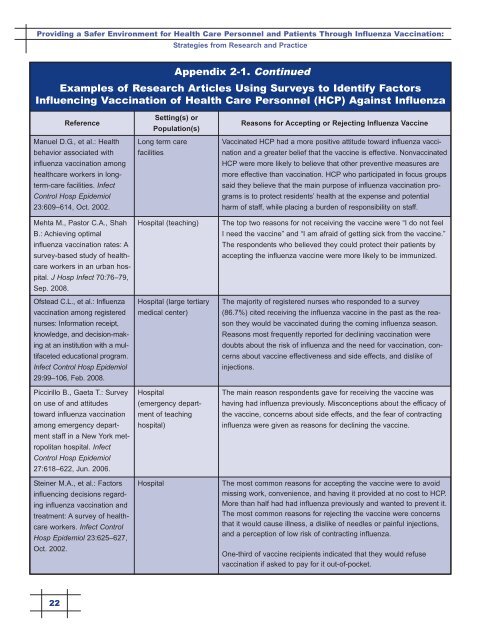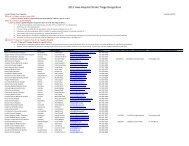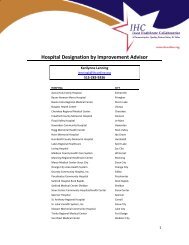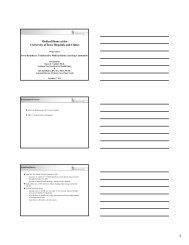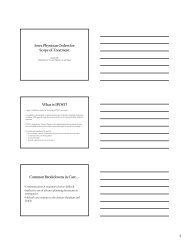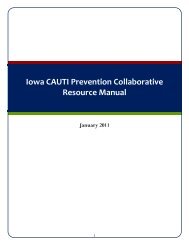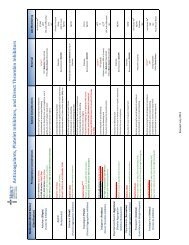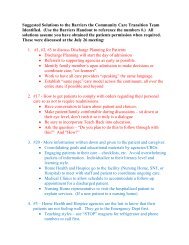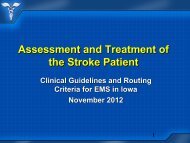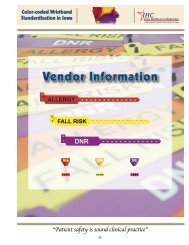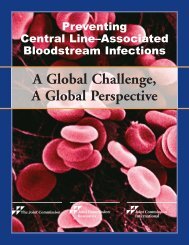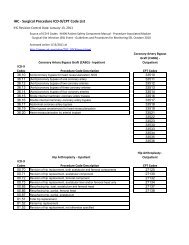Providing a Safer Environment for Health Care Personnel & Patients ...
Providing a Safer Environment for Health Care Personnel & Patients ...
Providing a Safer Environment for Health Care Personnel & Patients ...
Create successful ePaper yourself
Turn your PDF publications into a flip-book with our unique Google optimized e-Paper software.
<strong>Providing</strong> a <strong>Safer</strong> <strong>Environment</strong> <strong>for</strong> <strong>Health</strong> <strong>Care</strong> <strong>Personnel</strong> and <strong>Patients</strong> Through Influenza Vaccination:<br />
Strategies from Research and Practice<br />
Appendix 2-1. Continued<br />
Examples of Research Articles Using Surveys to Identify Factors<br />
Influencing Vaccination of <strong>Health</strong> <strong>Care</strong> <strong>Personnel</strong> (HCP) Against Influenza<br />
Reference<br />
Manuel D.G., et al.: <strong>Health</strong><br />
behavior associated with<br />
influenza vaccination among<br />
healthcare workers in longterm-care<br />
facilities. Infect<br />
Control Hosp Epidemiol<br />
23:609–614, Oct. 2002.<br />
Mehta M., Pastor C.A., Shah<br />
B.: Achieving optimal<br />
influenza vaccination rates: A<br />
survey-based study of healthcare<br />
workers in an urban hospital.<br />
J Hosp Infect 70:76–79,<br />
Sep. 2008.<br />
Ofstead C.L., et al.: Influenza<br />
vaccination among registered<br />
nurses: In<strong>for</strong>mation receipt,<br />
knowledge, and decision-making<br />
at an institution with a multifaceted<br />
educational program.<br />
Infect Control Hosp Epidemiol<br />
29:99–106, Feb. 2008.<br />
Piccirillo B., Gaeta T.: Survey<br />
on use of and attitudes<br />
toward influenza vaccination<br />
among emergency department<br />
staff in a New York metropolitan<br />
hospital. Infect<br />
Control Hosp Epidemiol<br />
27:618–622, Jun. 2006.<br />
Steiner M.A., et al.: Factors<br />
influencing decisions regarding<br />
influenza vaccination and<br />
treatment: A survey of healthcare<br />
workers. Infect Control<br />
Hosp Epidemiol 23:625–627,<br />
Oct. 2002.<br />
Setting(s) or<br />
Population(s)<br />
Long term care<br />
facilities<br />
Hospital (teaching)<br />
Hospital (large tertiary<br />
medical center)<br />
Hospital<br />
(emergency department<br />
of teaching<br />
hospital)<br />
Hospital<br />
Reasons <strong>for</strong> Accepting or Rejecting Influenza Vaccine<br />
Vaccinated HCP had a more positive attitude toward influenza vaccination<br />
and a greater belief that the vaccine is effective. Nonvaccinated<br />
HCP were more likely to believe that other preventive measures are<br />
more effective than vaccination. HCP who participated in focus groups<br />
said they believe that the main purpose of influenza vaccination programs<br />
is to protect residents’ health at the expense and potential<br />
harm of staff, while placing a burden of responsibility on staff.<br />
The top two reasons <strong>for</strong> not receiving the vaccine were “I do not feel<br />
I need the vaccine” and “I am afraid of getting sick from the vaccine.”<br />
The respondents who believed they could protect their patients by<br />
accepting the influenza vaccine were more likely to be immunized.<br />
The majority of registered nurses who responded to a survey<br />
(86.7%) cited receiving the influenza vaccine in the past as the reason<br />
they would be vaccinated during the coming influenza season.<br />
Reasons most frequently reported <strong>for</strong> declining vaccination were<br />
doubts about the risk of influenza and the need <strong>for</strong> vaccination, concerns<br />
about vaccine effectiveness and side effects, and dislike of<br />
injections.<br />
The main reason respondents gave <strong>for</strong> receiving the vaccine was<br />
having had influenza previously. Misconceptions about the efficacy of<br />
the vaccine, concerns about side effects, and the fear of contracting<br />
influenza were given as reasons <strong>for</strong> declining the vaccine.<br />
The most common reasons <strong>for</strong> accepting the vaccine were to avoid<br />
missing work, convenience, and having it provided at no cost to HCP.<br />
More than half had had influenza previously and wanted to prevent it.<br />
The most common reasons <strong>for</strong> rejecting the vaccine were concerns<br />
that it would cause illness, a dislike of needles or painful injections,<br />
and a perception of low risk of contracting influenza.<br />
One-third of vaccine recipients indicated that they would refuse<br />
vaccination if asked to pay <strong>for</strong> it out-of-pocket.<br />
22


